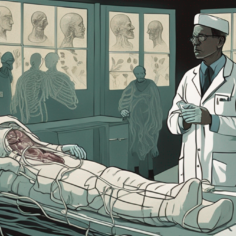
Cancer continues to be a global menace, claiming millions of lives every year. But the tide is turning. The field of oncology is experiencing unprecedented advancements, promising early detection, more effective treatments and improved quality of life for patients. Welcome to the dawn of a new horizon in cancer treatment.
Accelerating pace of breakthroughs
Thanks to the relentless efforts of scientists and researchers worldwide, the pace of breakthroughs in cancer treatment is accelerating. These emerging innovations span from novel therapies to cutting-edge detection devices. To fully appreciate the progress being made, it’s crucial to understand the advances in three significant areas: targeted therapies, immunotherapies, and early detection technologies.
(Read Also: Emerging Breakthroughs in Cancer Treatment: A Beacon of New Hope)
Targeted Therapies: Bullseye on Cancer
Targeted therapies work by exploiting specific genetic changes in cancer cells that help them grow, divide, and spread. One approach is using small molecule drugs or monoclonal antibodies to block the pathways that cancer cells use to survive and multiply. By specifically attacking these cancer cells, targeted therapies can lead to better outcomes with fewer side effects than traditional treatments, like chemotherapy.
Immuno-oncology: Unleashing the Body’s Defence
The human immune system is highly effective at identifying and destroying abnormal cells. However, cancer has devised cunning mechanisms to evade and suppress the immune response. Immuno-oncology research focuses on ‘releasing the brakes’ on the immune system, enabling it to recognize and combat cancer cells. Promising treatments in this field include checkpoint inhibitors and CAR T-cell therapy.
Early Detection: Speed is of the Essence
When it comes to cancer, early detection can be the difference between life and death. Innovative technologies like liquid biopsy, detecting cancer-related DNA or proteins in the blood, are transforming the landscape of early diagnosis and disease monitoring. In addition, advanced imaging technologies promise to detect tumours at increasingly early stages, improving prognosis and survival rates.
(Read Also: Managing Chronic Pain: Excellent Strategies and Effective Treatment Options)
Controversies and debates
While these advancements hold much promise, they are not without controversy. Some critics point out the staggering costs of new treatments, which could limit accessibility for many patients. The high price tag of precision medicine raises ethical debates about equity in healthcare provision. It will be crucial to balance the quest for cutting-edge treatments with efforts to make these therapies affordable and accessible to all.
Conclusion
The breakthroughs in cancer treatments offer a beacon of hope in the fight against this formidable disease. However, while celebrating these achievements, it’s important to acknowledge the ongoing challenges and controversies surrounding their application. As scientists, healthcare providers, and policymakers, we must work together to harness these innovations responsibly, ensuring they bring hope and healing to as many people as possible.
Last modified: 12 December 2023


















